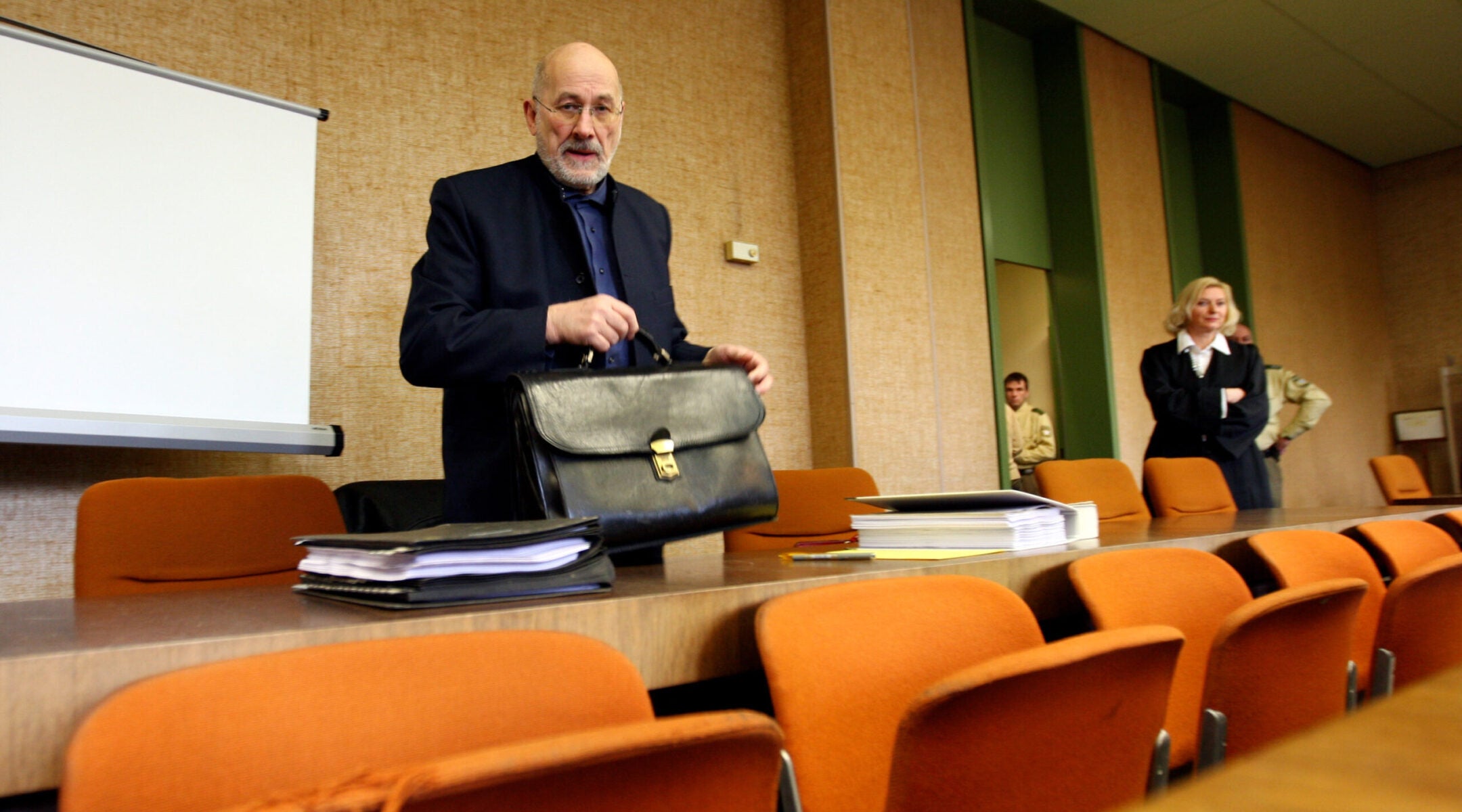Horst Mahler, one of Germany’s most prominent neo-Nazis, is dead at 89
Mahler came to his right-wing antisemitism and Holocaust denial after beginning as a left-wing activist who represented a Nazi hunter

Right-wing extremist Horst Mahler and his lawyer attend the trial against Mahler at the country court on Jan. 12, 2009 in Munich. Photo by Miguel Villagran/Getty Images
(JTA) — BERLIN – One of Germany’s most notorious postwar antisemitic agitators has died at 89.
Horst Mahler, who founded the German left-wing terrorist group Red Army Faction in 1970 and later championed neo-Nazis, died in a Berlin hospital on Sunday, according to his attorney, Jan Dollwetzel. Dollwetzel confirmed a statement from the far-right party Die Heimat, or The Homeland, which was formerly the neo-Nazi National Democratic Party of Germany.
Mahler spent much of his adult life in and out of jail. Initially, it was his left-wing extremism that landed him behind bars. But he made a dramatic about-face in the 1990s and remained a committed right-wing extremist to the end.
Mahler was born in 1936 in what is now Poland. The family moved to Berlin after the war. His father, a dentist, committed suicide in 1949, reportedly suffering from depression. Mahler studied law and became active in the 1960s West German student movement, representing left-wing activists. Among his clients was Beate Klarsfeld, the famed Nazi hunter, who faced charges stemming from her aggressive activism against German officials with a Nazi past.
He co-founded the Red Army Faction in 1970 with the now-infamous Andreas Baader, Gudrun Ensslin and Ulrike Meinhof, helping them organize bank robberies and terrorist training, and helping plan Baader’s escape from jail. Mahler was arrested that same year and served 10 years in prison, during which time he distanced himself from the left-extremist scene. He was able to reestablish his credentials as a lawyer with help from Gerhard Schröder, who later became the German chancellor.
His period of respectability did not last long. In the 1990s Mahler turned toward the radical right, later joining the NPD, and represented them against legal challenges by the German federal government.
In 2004 he himself was tried for incitement after telling journalists that hatred of Jews was “completely normal” and a “sign of mental health.”
In 2007, he told the Jewish publicist Michel Friedman, in a controversial interview for Vanity Fair magazine, that “Hitler was the liberator of the German people.”
That same year, Mahler was sentenced to six months in jail for raising his arm in the illegal “Hitler salute” to greet his jailers while serving a previous sentence.
In 2009, he was convicted of incitement of hate for posting Holocaust denial material on the Internet and distributing antisemitic CDs calling for violence against Jews.
Ultimately Mahler’s license to practice law was permanently revoked.
He was serving several combined prison sentences when he was released due to serious illness in 2015. Once free, he allegedly continued to give talks to neo-Nazi audiences. According to Die Zeit, a leading German newspaper, in January 2017 he spoke on such topics as “Jewry is the real enemy” and a so-called plan by Jews to destroy the German people.
Soon afterward, wanted by the authorities, Mahler fled to Hungary and appealed to Prime Minister Viktor Orban for asylum in a public letter and video, referring to him as the “Führer” of the Hungarian Nation. Instead of accepting him, Hungary honored Germany’s request for extradition.
Mahler was sent back to serve out his sentence, which he completed in 2020.
The threat of further jail time never appeared to dampen his antisemitic hate speech. During his final stint behind bars, Mahler wrote letters in which he raged about “foreign Jewish rule” and the “creation of the Holocaust narrative.” He said he considered himself a “prisoner of war,” the victim of “Jewish councils.”
Such statements were among the evidence gathered for what might have been his last trial, set for 2023. That trial was suspended due to his declining health.
Mahler’s trajectory shocked many in Germany at the time but now seems like a warning sign about contemporary politics to some who tracked his antics.
“Horst Mahler personified the way that antisemitism crosses ideological boundaries and can appeal to different, ostensibly opposing, extremist movements,” a spokesperson for the British Jewish watchdog organization Community Security Trust told the Jewish Telegraphic Agency. CST recently collaborated with the nonprofit Hope Not Hate on a study of connections between the two extreme camps in the United Kingdom.
“Even though on the surface the far right and far left are enemies, they share a contempt for liberal democracy and a conspiratorial view of the world in which Jews, or Zionists, are seen as an obstacle to their political objectives,” the spokespersons said. “Given this shared anti-Jewish worldview, Mahler’s political migration from far left to far right is not as uncommon as people might think.”














